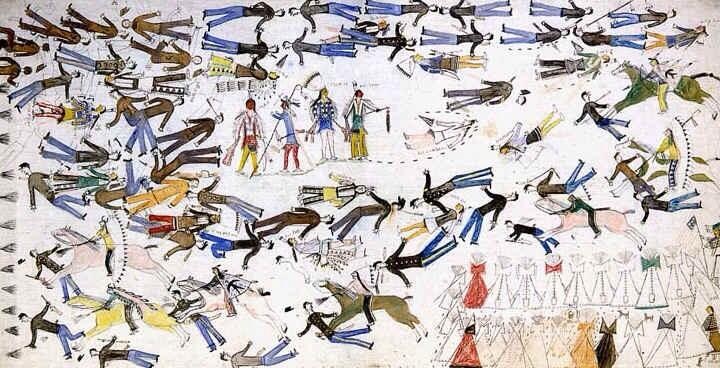June 25 Peace Love Art Activism
DEATH PENALTY
Thomas Bird
 June 25, 1790: the first federal execution. U.S. Marshall Henry Dearborn coordinated the hanging of Thomas Bird in Massachusetts. Bird was convicted of murdering his master, John Connor, captain of the slave ship Mary, off the coast of Africa. Dearborn spent five dollars and fifty cents for the construction of a gallows and a coffin. (see July 9, 1868)
June 25, 1790: the first federal execution. U.S. Marshall Henry Dearborn coordinated the hanging of Thomas Bird in Massachusetts. Bird was convicted of murdering his master, John Connor, captain of the slave ship Mary, off the coast of Africa. Dearborn spent five dollars and fifty cents for the construction of a gallows and a coffin. (see July 9, 1868)
Kennedy v. Louisiana
June 25, 2008: a divided U.S. Supreme Court barred the death penalty for the crime of child rape, saying a Louisiana man’s execution would violate the constitutional ban on cruel and unusual punishment. The justices, voting 5-4 in Kennedy v. Louisiana spared Patrick Kennedy from becoming the first person since 1964 to be executed in the U.S. for a crime other than murder. Kennedy was convicted of raping his 8-year-old stepdaughter.
“The death penalty is not a proportional punishment for the rape of a child,” Justice Anthony Kennedy wrote for the court. The ruling extended a line of Supreme Court cases that had restricted the circumstances in which the death penalty can be applied. It also underscores Kennedy’s significance as the court’s deciding vote on many social issues.
The court divided along ideological lines. Justices Stephen Breyer, John Paul Stevens, David Souter and Ruth Bader Ginsburg joined the majority. Chief Justice John Roberts and Justices Samuel Alito, Antonin Scalia, and Clarence Thomas dissented. [Oyez article] (see March 18, 2009)
June 25 Peace Love Art Activism
Immigration History
Alien and Sedition Act of 1798
June 25, 1798: Congress passed the Alien and Sedition Act of 1798, which empowered the President to deport any alien he found dangerous to the peace and safety of the Nation. These laws included new powers made it harder for new immigrants to vote. Previously a new immigrant would have to reside in the United States for five years before becoming eligible to vote, but a new law raised this to 14 years. (see March 2, 1819)
June 25 Peace Love Art Activism
Feminism
Olympia Brown
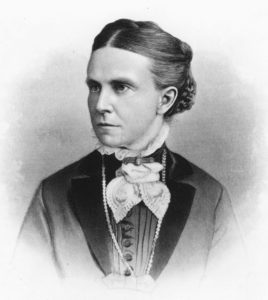 June 25, 1863: Olympia Brown ordained by the St. Lawrence Universalist Association, becoming possibly the first woman minister in the US ordained with full denominational authority [Harvard article] (see May 10, 1866)
June 25, 1863: Olympia Brown ordained by the St. Lawrence Universalist Association, becoming possibly the first woman minister in the US ordained with full denominational authority [Harvard article] (see May 10, 1866)
Mann Act
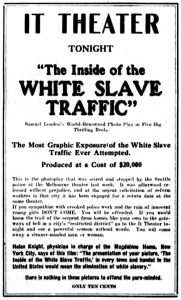 June 25, 1910: Congress passed the White Slavery Act, popularly known as the Mann Act, to fight interstate prostitution. The law made it a crime to transport across state lines “any woman or girl for the purpose of prostitution or debauchery, or for any other immoral purpose.” (The law was named for Rep. James Mann of Illinois.) It was a sign of the cultural and racial politics of the time that the law applied only to the transport of women and had the title, “White Slavery Act.” The law interfered with the right of unmarried people to cross state lines and to have sexual relations; because its terms were so vague and potentially expansive, for decades it was enforced in a highly arbitrary manner.
June 25, 1910: Congress passed the White Slavery Act, popularly known as the Mann Act, to fight interstate prostitution. The law made it a crime to transport across state lines “any woman or girl for the purpose of prostitution or debauchery, or for any other immoral purpose.” (The law was named for Rep. James Mann of Illinois.) It was a sign of the cultural and racial politics of the time that the law applied only to the transport of women and had the title, “White Slavery Act.” The law interfered with the right of unmarried people to cross state lines and to have sexual relations; because its terms were so vague and potentially expansive, for decades it was enforced in a highly arbitrary manner.
A number of prominent Americans fell victim to prosecution. They included the famed African-American boxer Jack Johnson (convicted in a racially motivated prosecution); the famous architect Frank Lloyd Wright (charges dropped in 1926); silent film star Charlie Chaplin (acquitted in 1944); and rock and roll star Chuck Berry (convicted in 1962 and sentenced to three years in prison for transporting a 24-year-old). (Feminism, see Dec 1910; BH, see Sept 29)
June 25 Peace Love Art Activism
Native Americans
Battle of the Greasy Grass
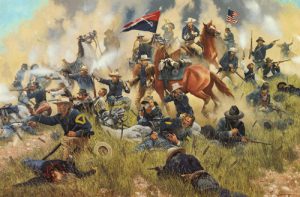 June 25, 1876: George A. Custer led an army detachment, encountered an encampment of Sioux and Cheyenne at the Little Bighorn River. The Native Americans annihilated Custer’s detachment, but the US continued its battle against the Sioux in the Black Hills until the government confiscated the land in 1877. [Indian Country Today article] (see Aug 15)
June 25, 1876: George A. Custer led an army detachment, encountered an encampment of Sioux and Cheyenne at the Little Bighorn River. The Native Americans annihilated Custer’s detachment, but the US continued its battle against the Sioux in the Black Hills until the government confiscated the land in 1877. [Indian Country Today article] (see Aug 15)
Adoptive Couple v. Baby Girl, a Minor Child Under the Age of Fourteen Years
June 25, 2013: the US Supreme Court decided that a Native American child did not have to be taken away from her adoptive parents and given to her biological father. The justices ruled 5-4 in a case about a federal law intended to keep Indian children from being taken from their homes and typically placed with non-Indian adoptive or foster parents. South Carolina courts had said that the 1978 Indian Child Welfare Act favored the biological father of the girl. The South Carolina couple who raised her for the first 27 months of her life had appealed that decision. (see July 15)
June 25 Peace Love Art Activism
US Labor History
Anarchism in the US
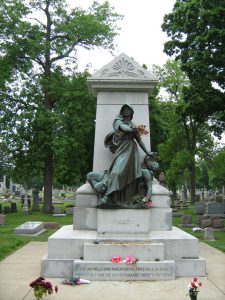 June 25, 1893: the Haymarket Martyrs Monument was dedicated at Forest Home Cemetery in Forest Park, Illinois, to honor those framed and executed for the bombing at Chicago’s Haymarket Square on May 4, 1886. More than 8,000 people attended the dedication ceremony. At the base of the monument are the last words of Haymarket martyr August Spies: “The day will come when our silence will be more powerful than the voices you are throttling today.” [ILHS article] (next Anarchism, see June 26; next Labor, see Sept 2)
June 25, 1893: the Haymarket Martyrs Monument was dedicated at Forest Home Cemetery in Forest Park, Illinois, to honor those framed and executed for the bombing at Chicago’s Haymarket Square on May 4, 1886. More than 8,000 people attended the dedication ceremony. At the base of the monument are the last words of Haymarket martyr August Spies: “The day will come when our silence will be more powerful than the voices you are throttling today.” [ILHS article] (next Anarchism, see June 26; next Labor, see Sept 2)
Fair Labor Standards Act 1938
June 25, 1938: Franklin D Roosevelt signed The Fair Labor Standards Act 1938. The FLSA established a national minimum wage, guaranteed ‘time-and-a-half’ for overtime in certain jobs, and prohibited most employment of minors in “oppressive child labor,” a term that is defined in the statute. [US DoL article] (see January 7, 1939)
Executive Order 8802
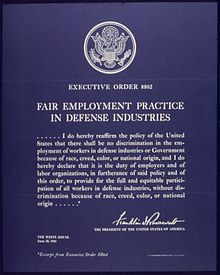 June 25, 1941: President Franklin D. Roosevelt signed Executive Order 8802, which established a Fair Employment Practices Committee (FEPC) to ensure equal employment opportunity for African Americans in the defense industries. It was the first-ever federal rule prohibiting employment discrimination on the basis of race. [text via Our Documents] (see January 12, 1942)
June 25, 1941: President Franklin D. Roosevelt signed Executive Order 8802, which established a Fair Employment Practices Committee (FEPC) to ensure equal employment opportunity for African Americans in the defense industries. It was the first-ever federal rule prohibiting employment discrimination on the basis of race. [text via Our Documents] (see January 12, 1942)
“Freedom’s Road”
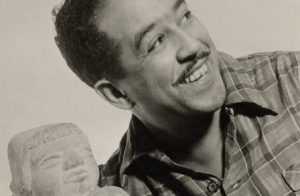 In 1942, Langston Hughes wrote the lyrics, Emerson Harper wrote the music, and Josh White sang “Freedom’s Road” in which they attempted to link the war abroad to the struggle for racial justice at home.
In 1942, Langston Hughes wrote the lyrics, Emerson Harper wrote the music, and Josh White sang “Freedom’s Road” in which they attempted to link the war abroad to the struggle for racial justice at home.
| That’s why I’m marching, yes, I’m marching,
Marching down freedom’s road. Ain’t nobody gonna stop me, nobody gonna keep me, From marching down freedom’s road. Hand me my gun, let the bugle blow loud, I’m on my way with my head a-proud, One objective I’ve got in view, Is to keep a hold of freedom for me and you That’s why I’m marching, yes, I’m marching, Marching down freedom’s road. Ain’t nobody gonna stop me, nobody gonna keep me, From marching down freedom’s road. Ought to be plain as the nose on your face, There’s room in this plan for every race, Some folk think that freedom just ain’t right, |
Those are the very people I want to fight.
That’s why I’m marching, yes, I’m marching, Marching down freedom’s road. Ain’t nobody gonna stop me, nobody gonna keep me, From marching down freedom’s road. Now, Hitler may rant, Hirohito may rave, I’m going after freedom if it leads me to my grave. That’s why I’m marching, yes, I’m marching, I’m marching down freedom’s road. United we stand, divided we fall, Let’s make this land safe for one and all. I’ve got a message, and you know it’s right, Black and white together unite and fight. That’s why I’m marching, yes, I’m marching, Marching down freedom’s road. Ain’t no fascists gonna stop me, no Nazis gonna keep me, From marching down freedom’s road. |
Link to recitation of “Freedom Road”
Smith-Connally Act
June 25, 1943: enacted over President Roosevelt’s veto, Congress passed the Smith-Connally Act (also called the War Labor Disputes Act) allowing the government to take over critical industries hit by strikes. It also prevented unions from contributing to political campaigns. [Cambridge U Press article] (see August 1, 1944)
June 25 Peace Love Art Activism
BLACK HISTORY
Jack Johnson
June 25, 1913: boxer Jack Johnson skipped bail and left the country, joining wife Lucille in Montreal, before fleeing to France. In order to flee to Canada to skip his bail, Johnson posed as a member of a black baseball team. For the next seven years, they lived in exile in Europe, South America and Mexico. [2016 Washington Post article] (next BH, see July 21; next JJ, see July 20, 1914)
Baton Rouge bus boycott
June 25, 1953: to end the Baton Rouge bus boycott, the city agreed to a compromise: the two side front seats of buses were to be reserved for whites and the long rear seat was for African Americans. The remaining seats were to be occupied on a first-come-first-served basis. The Black community agreed to the compromise and the boycott ended. [Black Past article] (see Aug 13)
Church burning
June 25, 1964: Williams Chapel in Ruleville, Mississippi, was firebombed in the middle of the night. The chapel, located a few miles from the home of then-candidate for Congress Mrs. Fannie Lou Hamer, was a site of voter registration activity. The fire caused slight damage, but volunteer firefighters quickly controlled and eliminated the blaze. Eight containers of gasoline were found later at the scene. (Burning, see June 21, 1995)
St. Augustine, Florida
June 25, 1964: in the summer of 1964, Rev. Dr. Martin Luther King, Jr. and other Southern Christian Leadership Conference leaders began anti-segregation work in St. Augustine, Florida. They held weeks of civil rights demonstrations and marches, and many demonstrators, including Dr. King, were arrested. After weeks of activism and outbreaks of violence between segregationists and anti-segregationists, Florida Governor Farris Bryant, a segregationist, issued a ban on evening demonstrations held after 8:30 p.m.
On June 25, 300 anti-segregationist marchers who had spent the afternoon rallying at the site of St. Augustine’s former slave market, Slave Market Square, were violently attacked by over 200 white segregationists. The segregationists easily evaded police and physically assaulted the marchers. As the marchers fled, they were chased and attacked across the city’s downtown area. Close to fifty of the marchers were injured, and fifteen were treated at the city’s hospital. Several hours before the attacks on the marchers, seventy-five white segregationists had attacked a group of 100 African Americans who attempted to wade into the ocean at a local “white beach,” and twenty people were arrested. Such violent clashes between anti-segregationists and segregationists in St. Augustine continued throughout June 1964. (see June 29)
James H Meredith
June 25, 1966: Meredith returned to head his march through Mississippi. [American Heritage article] (see June 26)
Norwood v. Harrison
June 25, 1973: the US Supreme Court ruled that states cannot provide textbooks to racially segregated private schools to avoid integration mandates. [Justia article] (BH, see June 27; SD, see July 21, 1974)
School Desegregation
June 25, 1976: Bobbe’s School denied admission to Michael McCrary and Colin Gonzales, two African American students. Fairfax-Brewster School had also denied admission to Gonzales.
Their parents filed a class action lawsuit against the schools. A federal district court ruled for McCrary and Gonzales, finding that the school’s admission policies were racially discriminatory. The United States Court of Appeals affirmed the decision.
On this date the US Supreme Court held 7 – 2 that federal law prohibited private schools from discriminating on the basis of race. [Oyez article] (BH, see July 12; SD, see February 6, 1986)
Clement A. Lloyd
June 25, 1991: a Florida state appeals court overturned the manslaughter conviction of police officer William Lozano whose 1989 killing of a black motorcyclist Clement A. Lloyd set off three days of racial disturbances that scorched the city.
Florida’s Third District Court of Appeals also ordered a new trial, ruling that a lower court had erred by not considering a defense motion to move the trial out of racially charged Miami. (BH, see July 1; RR, see May 28, 1993)
Shelby County, Alabama v Holder, Attorney General, Et Al
June 25, 2013: the Supreme Court struck down a central portion of the Voting Rights Act (VRA) effectively ending the practice in which some states with a history of racial discrimination must receive clearance from the federal government before changing voting laws. The vote was five to four, with the five conservative-leaning judges in the majority and the four liberal-leaning justices in the minority. Chief Justice John G. Roberts Jr. wrote the decision. The majority held that Section 4 of the Voting Rights Act, originally passed in 1965 and since updated by Congress was unconstitutional. The section includes a formula that determines which states must receive pre-approval. The court did not strike down Section 5, which allows the federal government to require pre-approval. But without Section 4, which determines which states would need to receive clearance, Section 5 is largely without significant — unless Congress chooses to pass a new bill for determining which states would be covered.
Justice Ruth Bader Ginsburg noted in dissent that covered jurisdictions continued to propose voting law changes that were rejected under the VRA, “auguring that barriers to minority voting would quickly resurface were the preclearance remedy eliminated.” [Cornell Law School article] (BH, see July 12; VR, see October 1, 2014)
Voting Rights
June 25, 2013: the Supreme Court declared unconstitutional key sections of the 1965 Voting Rights Act, eliminating what most experts regarded as the crucial enforcement mechanism of the law. At issue were Section 5 and Section 4b. Section 5 required certain states or local jurisdictions to obtain pre-clearance from the Justice Department about any change in voter registration requirements or voting district composition. Section 4b prescribed the formula to be used to determine which jurisdictions are covered by Section 5. The data in Section 4b is used to identify jurisdictions with histories of racial discrimination in voting. The Supreme Court held that the 4b formula was based on data that are 40 years old and therefore no longer relevant to current conditions.
The Court ruled 5–4 that the result was a constitutionally impermissible burden on the affected jurisdictions, based on principles of federalism’s equal sovereignty of the states. The Court did not declare Section 5 unconstitutional but, without the Section 4b formula, no state would be subject to Section 5 (unless, that is, Congress enacted a new formula). [NYT article] (see October 1, 2014)
Michelle Obama/White House/Slavery
June 25, 2016: First Lady Michelle Obama gave a speech at the Democratic National Convention acknowledging the history of American slavery. Reflecting on our national history, Mrs. Obama remarked during her July 25th speech: “The story of this country, the story that has brought me to this stage tonight, the story of generations of people who felt the lash of bondage, the shame of servitude, the sting of segregation” she explained, “is the story of striving and hoping and doing what needed to be done so that today I wake up every morning in a house that was built by slaves.”
Following her truthful statement, many Republicans and conservatives denounced her statement, thought others realized that their questions were actually an attempt to avoid the truth rather than reveal it. [EJI article] (next BH, see Nov 2)
Gerrymandering
June 25, 2018: the Supreme Court passed up an opportunity to take another look at whether the Constitution bars extreme partisan gerrymandering, returning a case from North Carolina to a trial court there for a further examination of whether the challengers had suffered the sort of direct injury that would give them standing to sue. (VR & NC, see Aug 27)
June 25 Peace Love Art Activism
Cold War
 June 25, 1950: Communist North Korean troops invaded South Korea, beginning the Korean War. [CNN summary of war] (see June 26)
June 25, 1950: Communist North Korean troops invaded South Korea, beginning the Korean War. [CNN summary of war] (see June 26)
June 25 Peace Love Art Activism
Technological Milestone
June 25, 1951: the first commercial color broadcast took place at 4:35 PM when CBS offered an hour-long program entitled “Premiere” to an ad-hoc network of five stations in New York City, Boston, Philadelphia, Baltimore and Washington. Among those participating in the program were Arthur Godfrey, Ed Sullivan, Robert Alda, Faye Emerson, William S. Paley and Frank Stanton (the latter two board chairman and president of CBS, respectively)
Thousands were able to watch the first color broadcast in auditoriums, department stores and hotels in the five cities, but the general public was left in the dark — literally. Because the CBS color system was incompatible with existing black and white television sets, for the hour the color special was on the air, viewers tuned to CBS in any of the five cities saw only a blank screen. (see Sept 4)
June 25 Peace Love Art Activism
June 25 Music et al
Bill Evans
June 25, 1961, Bill Evans’s album Sunday at the Village Vanguard recorded.
“Paperback Writer”
June 25 – July 1, 1966, The Beatles “Paperback Writer” #1 on the Billboard Hot 100. (see July 29)
Our World broadcast
June 25, 1967: Our World broadcast. It was the first live, international, satellite television production. Creative artists, including The Beatles, opera singer Maria Callas, and painter Pablo Picasso, representing nineteen different nations were invited to perform or appear in separate segments featuring their respective countries. The two-and-half-hour event had the largest television audience ever up to that date: an estimated 400 million people around the globe watched the broadcast Beatles perform “All You Need Is Love.” The program was watched by 400 million in 26 countries. The BBC had commissioned the Beatles to write a song for the United Kingdom’s contribution.
Broadcast live around the world from the Abbey Road Studios in London, it featured the band singing and playing along to a pre-recorded track, joined in the studio by guests Mick Jagger and Marianne Faithfull, Keith Richards, Keith Moon, Eric Clapton, George’s wife Pattie, Paul’s fiance Jane Asher and his brother Mike, Graham Nash and his wife, and others. (see July 1)
June 25 Peace Love Art Activism
Religion and Public Education
SEPARATION OF CHURCH AND STATE
Engel v. Vitale
June 25, 1962: the US Supreme Court ruled that the Regents’ Prayer, recited daily in New York public schools, violated the establishment clause of the First Amendment. Despite claims that the prayer was denominationally neutral and that students could choose to remain silent or leave the room, the Court argued that in composing an “official prayer” and coordinating a daily religious observance, the state had violated the First Amendment. [Oyez article] (see June 27)
Boerne v. Flores
June 25, 1997: the US Supreme Court held that the Religious Freedom Restoration Act (RFRA), enacted on November 16, 1993, was unconstitutional as it applied to the states.
The controversy originated with the Supreme Court decision in Employment Division v. Smith, decided on April 17, 1990, in which the Court upheld the denial of unemployment benefits to Alfred Smith because he used peyote. Smith claimed that he used peyote as part of a traditional Native American religious ritual. That decision outraged leaders from many different religions across the country, leading to the enactment of RFRA.
The Boerne case involved a zoning dispute in the city of Boerne, Texas, near San Antonio, in which the city sought to prevent the expansion of a church because it was located in an historic district; the church responded that the city could not restrict its free exercise of religion under RFRA. The Supreme Court decided in favor of the city, holding that RFRA exceeded the powers allowed it under the Fourteenth Amendment. [Justia article]
OK Religious Charter School Blocked
June 25, 2024: the Oklahoma Supreme Court blocked what would have been the nation’s first religious charter school, delivering a setback to a conservative movement that has increasingly fought for public dollars to go toward religious education.
“Enforcing the St. Isidore contract would create a slippery slope,” the court wrote, directing the state to rescind its contract with St. Isidore. Six justices agreed, while two dissented all or in part. [ACLU article] (next Separation, see Nov 12)
June 25 Peace Love Art Activism
Cultural Milestone
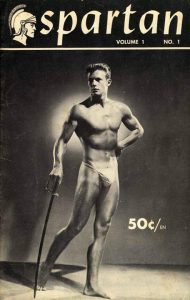 June 25, 1962: Manual Enterprises v. Day: The United States Supreme Court ruled that photographs of nude men are not obscene, decriminalizing nude male pornographic magazines. [Oyez article] (see July 9)
June 25, 1962: Manual Enterprises v. Day: The United States Supreme Court ruled that photographs of nude men are not obscene, decriminalizing nude male pornographic magazines. [Oyez article] (see July 9)
June 25 Peace Love Art Activism
FREE SPEECH
Mary Hamilton
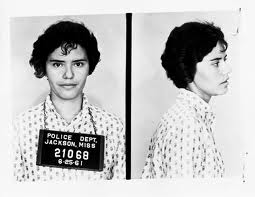 June 25, 1963: Mary Hamilton (October 13, 1935—November 11, 2002) was a field secretary for the Congress of Racial Equality in Alabama. Along with hundreds of others, she had been arrested during civil rights protests in Gadsden. At a hearing on June 25 challenging the legitimacy of those arrests, she refused to answer questions on the witness stand until she was addressed with the same courtesy accorded white witnesses. At that time, in the South and in many other parts of the nation, it was customary for judges and prosecutors to address white witnesses by last name and courtesy titles such as “Mr. Jones” or “Mrs. Smith”, while addressing all nonwhite witnesses by the first name without honorific. When the county prosecutor addressed Hamilton by her first name only, she said she would not answer any questions unless she were addressed as “Miss Hamilton”. When she persisted in her demand to be addressed in this manner, the judge held her in contempt of court and sentenced her to five days in jail and a $50 fine. [2013 NPR article] (BH, see June 26; Hamilton, see March 30, 1964)
June 25, 1963: Mary Hamilton (October 13, 1935—November 11, 2002) was a field secretary for the Congress of Racial Equality in Alabama. Along with hundreds of others, she had been arrested during civil rights protests in Gadsden. At a hearing on June 25 challenging the legitimacy of those arrests, she refused to answer questions on the witness stand until she was addressed with the same courtesy accorded white witnesses. At that time, in the South and in many other parts of the nation, it was customary for judges and prosecutors to address white witnesses by last name and courtesy titles such as “Mr. Jones” or “Mrs. Smith”, while addressing all nonwhite witnesses by the first name without honorific. When the county prosecutor addressed Hamilton by her first name only, she said she would not answer any questions unless she were addressed as “Miss Hamilton”. When she persisted in her demand to be addressed in this manner, the judge held her in contempt of court and sentenced her to five days in jail and a $50 fine. [2013 NPR article] (BH, see June 26; Hamilton, see March 30, 1964)
The Red Scare
June 25, 1963: North Carolina enacted a law that banned from speaking on state college and university campuses “known” Communists, “known” advocates of the violent overthrow of the state, and persons who took the Fifth Amendment regarding Communist Party membership.
On March 9, 1966, Frank Wilkinson, leader of the campaign to abolish the House Committee on Un-American Activities (HUAC), and Herbert Aptheker, a historian and member of the Communist Party, mocked the ban by speaking to students from the other side of the low wall that circles the University of North Carolina campus. In February 1968, a three-judge District Court panel deliberated for 10 minutes and then declared the ban unconstitutional. (FS, see Sept 10; North Carolina and Red Scare, see March 9, 1966)
American flag upside down
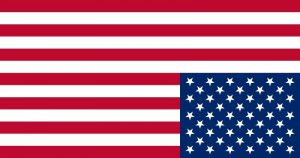 June 25, 1974: on May 10, 1970, to protest the Vietnam War, a college student (Spence) had hung an American flag upside down outside his apartment window. He had attached a peace symbol to the flag with removable tape. He was convicted under a Washington State law forbidding attaching anything to the U.S. flag. The Supreme Court on this day, in Spence v. Washington, reversed his conviction on the grounds that it infringed on his freedom of expression. [Oyez article] (see Nov 27)
June 25, 1974: on May 10, 1970, to protest the Vietnam War, a college student (Spence) had hung an American flag upside down outside his apartment window. He had attached a peace symbol to the flag with removable tape. He was convicted under a Washington State law forbidding attaching anything to the U.S. flag. The Supreme Court on this day, in Spence v. Washington, reversed his conviction on the grounds that it infringed on his freedom of expression. [Oyez article] (see Nov 27)
Frank Collin and Nazi sympathizers
June 25, 1978: Frank Collin and Nazi sympathizers were to march in front of Skokie’s Village Hall. The march was called off when the City of Chicago relented and permitted the group to march in Marquette Park on July 9. (FS, see July 3; Frank Collin, see July 9)
Island Trees v. Pico
June 25, 1982: the case involved a challenge to the removal of noted literary works from the library of the New York Island Trees School District because the Board of Education deemed them “anti-American, anti-Christian, anti-Sem[i]tic, and just plain filthy.” The censorship included such recognized classics as Kurt Vonnegut’s Slaughterhouse Five; Richard Wright’s, Black Boy; and an anthology of Best Negro Short Stories edited by the famed African-America poet Langston Hughes, among others. The Supreme Court split 4–4 on this day, with one Justice holding that the Court did not need to decide the issue. The result left the lower court ruling favoring the school district’s position. [Justia article] (see Aug 12)
June 25 Peace Love Art Activism
INDEPENDENCE DAYS
Mozambique
 June 25, 1975: Mozambique independent of Portugal. [Face to Face Africa article] (see July 5)
June 25, 1975: Mozambique independent of Portugal. [Face to Face Africa article] (see July 5)
Croatia and Slovenia
June 25, 1991: Croatia and Slovenia declared their independence from Yugoslavia. [UPI article] (see Sept 8)
June 25 Peace Love Art Activism
TERRORISM
June 25, 1996: Dhahran, Saudi Arabia: truck bomb exploded outside Khobar Towers military complex, killing 19 American servicemen and injuring hundreds of others. 13 Saudis and a Lebanese all alleged members of Islamic militant group Hezbollah, were indicted on charges relating to the attack in June 2001. [NYT article] (see Nov 29)
June 25 Peace Love Art Activism
ADA
AIDS
June 25, 1998: in Bragdon v. Abbott,the U.S. Supreme Court ruled that the Americans with Disabilities Act (ADA) covers those in earlier stages of HIV disease, not just those who have developed AIDS. [law dot uh dot edu article] (ADA, see Dec 31; AIDS, see Nov 12)
June 25 Peace Love Art Activism
CLINTON IMPEACHMENT
June 25, 1998
- the Supreme Court ruled 6-3 that attorney-client privilege extends beyond the grave, exempting Vince Foster’s conversations with his lawyers from being called as evidence in Ken Starr’s presidential investigations.
- White House communications aide Sidney Blumenthal testified before Ken Starr’s grand jury for the third time. Blumenthal complained that Starr’s inquiry focused on what the White House was saying about his prosecution rather than Blumenthal’s conversations with the president. (see Clinton for expanded story)
June 25 Peace Love Art Activism
Crime and Punishment
June 25, 2012: in Miller v. Alabama, the US Supreme Court held that mandatory sentences of life without the possibility of parole were unconstitutional for juvenile offenders. The ruling extended beyond the Graham v. Florida (May 17, 2010) case, which had ruled juvenile life without parole sentences unconstitutional for crimes excluding murder. [Oyez article] (see June 26, 2015)
June 25 Peace Love Art Activism
LGBTQ
June 25, 2014
Same sex marriage appeal upheld
The three-judge 10th U.S. Circuit Court of Appeals panel in Denver ruled 2-1 that states cannot deprive people of the fundamental right to marry simply because they want to be wedded to someone of the same sex. The panel found that the Constitution protects same-sex relationships. The judges added they don’t want to brand as intolerant those who oppose gay marriage, but said there is no reasonable objection to the practice.
“It is wholly illogical to believe that state recognition of love and commitment of same-sex couples will alter the most intimate and personal decisions of opposite-sex couples,” they wrote, addressing arguments that the ruling could undermine traditional marriage.
The decision upheld a lower court ruling that struck down Utah’s gay marriage ban. However, the panel immediately put Wednesday’s ruling on hold so it could be appealed, either to the entire 10th Circuit or directly to the nation’s highest court. [WTOP article]
Same sex marriage ban ruled unconstitutional
U.S. District Judge Richard Young ruled that Indiana’s ban on gay marriage was unconstitutional, immediately allowing same-sex couples across the state to receive marriage licenses.
Young did not issue a stay on his ruling. However, a spokesman for Attorney General Greg Zoeller, whose office represented the state, said they would “quickly ask for a stay of today’s ruling pending appeal.”
Marion County Clerk Beth White said she was prepared to issue marriage licenses to same-sex couples in her office at the City-County Building in Downtown Indianapolis. [USA Today article] (see July 18)
Arlene’s Flowers v. Washington
June 25, 2018, LGBTQ: in the case of Arlene’s Flowers v. Washington (a florist who argued that requiring her to create custom floral arrangements for a same-sex wedding would violate her religious beliefs) the US Supreme Court vacated and remanded the State Supreme Court decision that an antigay florist had violated the state’s nondiscrimination laws by refusing to serve a gay couple.
“The Supreme Court…asked the Washington courts to re-examine our clients’ case in light of the recent decision in Masterpiece Cakeshop,” said James Esseks, director of ACLU’s LGBT and HIV Project. [ACLU article] (see July 13)
June 25 Peace Love Art Activism
Fourth Amendment
Riley v. California
June 25, 2014: the US Supreme Court unanimously held that the warrantless search and seizure of digital contents of a cell phone during an arrest was unconstitutional. [Harvard Law Review article] (see Dec 11)
June 25 Peace Love Art Activism
Affordable Care Act
June 25, 2015: in King v Burwell, the US Supreme Court voted 6 – 3 and upheld a key provision of the Affordable Care Act and agreed with the Obama administration that government subsidies that make health insurance affordable for millions of Americans should be available to all.
The court affirmed an Internal Revenue Service ruling that subsidies should be available not only in states that have set up their own health insurance exchanges, but also in those where consumers rely on the federal government exchange.
The decision for the second time defused a potential conflict between President Obama and the Supreme Court over his most notable domestic achievement. While there are more challenges to come, an adverse ruling in this case would have been close to a mortal blow to the act that continue to divide the nation and its political conversation. [Oyez article] (see March 13, 2017)
June 25 Peace Love Art Activism
Fair Housing
June 25, 2015: in Texas Department of Housing and Community Affairs v. Inclusive Communities Project, the US Supreme Court voted 5 – 4 and gave an unexpected reprieve to civil rights groups, ruling that housing discrimination need not be intentional in order to be illegal.
The justices said people objecting to lending, zoning, sales, and rental practices only need to show that they had a disparate impact on blacks or other minorities under a federal fair-housing law.
The decision, written by Justice Anthony Kennedy, was an unlikely conclusion to a years-long effort by opponents of the civil rights-era law to reduce its effectiveness against housing policies and practices used by many builders, lenders and insurers. Twice before, the justices had agreed to hear a challenge to the law, only to see the cases withdrawn or settled before reaching court.
“The Court acknowledges the Fair Housing Act’s continuing role in moving the nation toward a more integrated society,” Kennedy wrote. [USA Today article] [Oyez article] (see July 8)
June 25 Peace Love Art Activism
Immigration History
June 25, 2018: Kevin K. McAleenan, the commissioner of Customs and Border Protection said that his agency had temporarily stopped handing over migrant adults who cross the Mexican border with children for prosecution, undercutting claims by other Trump administration officials that “zero tolerance” for illegal immigration is still in place.
McAleenan said his agency and the Justice Department should agree on a policy “where adults who bring their kids across the border — who violate our laws and risk their lives at the border — can be prosecuted without an extended separation from their children.” [NYT article] (see June 26)
June 25 Peace Love Art Activism
June 25 Peace Love Art Activism, June 25 Peace Love Art Activism, June 25 Peace Love Art Activism, June 25 Peace Love Art Activism, June 25 Peace Love Art Activism, June 25 Peace Love Art Activism, June 25 Peace Love Art Activism, June 25 Peace Love Art Activism, June 25 Peace Love Art Activism,

